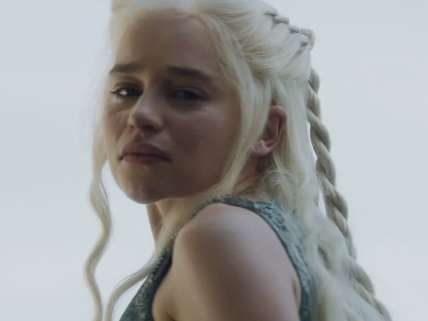On Game of Thrones Finale, Neoconservativsm Is Scrutinized
The conquest of Mereen invites obvious comparisons to the Wars in Iraq and Afghanistan.


(Spoilers for last night's Game of Thrones season finale to follow.)
"Do you remember where the heart is?"
This is what a dying Sandor Clegane asks Arya. He is not asking her in the figurative sense. He is not asking, do you remember how to love? Do you remember how to feel? He is asking her if she remembers the precise location of the heart inside the chest. He is asking her to kill him, and quickly. The closest thing to compassion in the world of Game of Thrones is a speedy death.
Do you remember where the heart is? would be an apt question to ask anyone who has watched Game of Thrones through four seasons of brutal destruction. On the show, even the corpses of the dead find occasion to claw at the boots of the living, attempting murder. Losing oneself in Game of Thrones each week means losing oneself in an orgy of human misery.
It's a realistic orgy, though (except for the fantastical elements). And it is one with parallels to our own world and time that are worth exploring.
Perhaps nothing in GOT resonates as well as Daenerys's conquest of Mereen, which invites obvious comparisons to the Wars in Iraq and Afghanistan. Earlier this season, Daeny pledged to free the slaves, rescue a downtrodden populace from an antiquated social order, and rule the city as a wise and modern queen. Superior firepower (dragons) is not her only weapon: She also wields the weapon of rhetoric, couching her conquest in terms of liberation and good vs. evil. Her slogan, "Breaker of Chains and Mother of Dragons," might as well be a giant MISSION: ACCOMPLISHED banner.
But killing is simple. Living is the hard part. In the season for finale that aired last night, Daenerysfinds Mereen more easily conquered than ruled. The displaced former rulers, the Wise Masters, rightly feel mistreated. Many of the now former slaves don't know what to do, and some even wish to go back to their chains. And most striking of all, Daeny encounters the Mereneese equivalent of a drone warfare victim: a father whose child was incinerated by death from above, an inadvertent casualty of Daeny's efforts to remake the city.
Daeny has no choice but to hedge on some of her fundamental beliefs, and suddenly, the Breaker of Chains is reshackling her freed slaves, as well as the dragons she claims as her children.
At a time when more and more people are questioning whether U.S. forces can ever achieve their goals in Iraq, and a growing chorus of voices believes the war was a mistake, it is hard not to see our foreign policy foibles reflected in Daeny's story. (Read Lucy Steigerwald at Antiwar.com for more on this viewpoint.)
The Mother of Dragons is not the only person whose children are making trouble in the finale (indeed, it was titled "The Children.") In King's Landing, Jaime, Cersei, and Tyrion all find ways to frustrate their father. Jaime disobeys Tywin by siding with Tyrion and freeing him. Cersei says she would sooner burn their family house to the ground than play the part she has been asked to play. And Tyrion actually walks up the steps to his father's privy and kills the man.
The murder will be hugely consequential for the political reality of Westeros. Tywin Lannister, the man who won the war and united the Seven Kingdoms under his grandson's reign, is now dead. This renews the hope that other political factions have to take the throne, and likely serves to tear the realm further apart in its immediate future—a future where an undead army, dragons, and a change of seasons are likely to play significant destructive roles.
Tywin's death shows how political developments are divorced from practical considerations. The people who rise to the top in Westeros aren't the ones most interested in defending the common people. In fact, the leaders most dedicated to the general welfare of the world are all gathered at the Wall, hundreds of miles from the Iron Throne. In contrast, the people who hover around the throne are the people interested in power for its own sake. And these people keep feuding with each other, and keep dying, further destabilizing the realm.
There was finally good news at the Wall, however, where Stannis's forces arrived to put an end to the wildling assault. The wildlings want to cross the north's giant border fence, but the Night's Watch has balked at the idea of allowing them into the Seven Kingdoms. Would Jon Snow and Stannis be better served by a more lenient immigration policy? It seems clear that the wildlings' primary aim is not war with the people of Westeros, but rather refuge from the hordes of zombies and ice demons. The Watch and the wildlings will need to negotiate some mutua peace in order to survive. Thankfully, Jon's friendly relations with wildling leaders Mance and Tormund will likely come in handy in that regard.
Speaking of immigration, Arya elects to vote with her feet—at long last—and head for the Free City of Braavos. It's a surprisingly hopeful image to close out the fourth season. We don't know precisely what is in store for her, but we know it can't be worse than the world she is leaving behind.


Show Comments (191)